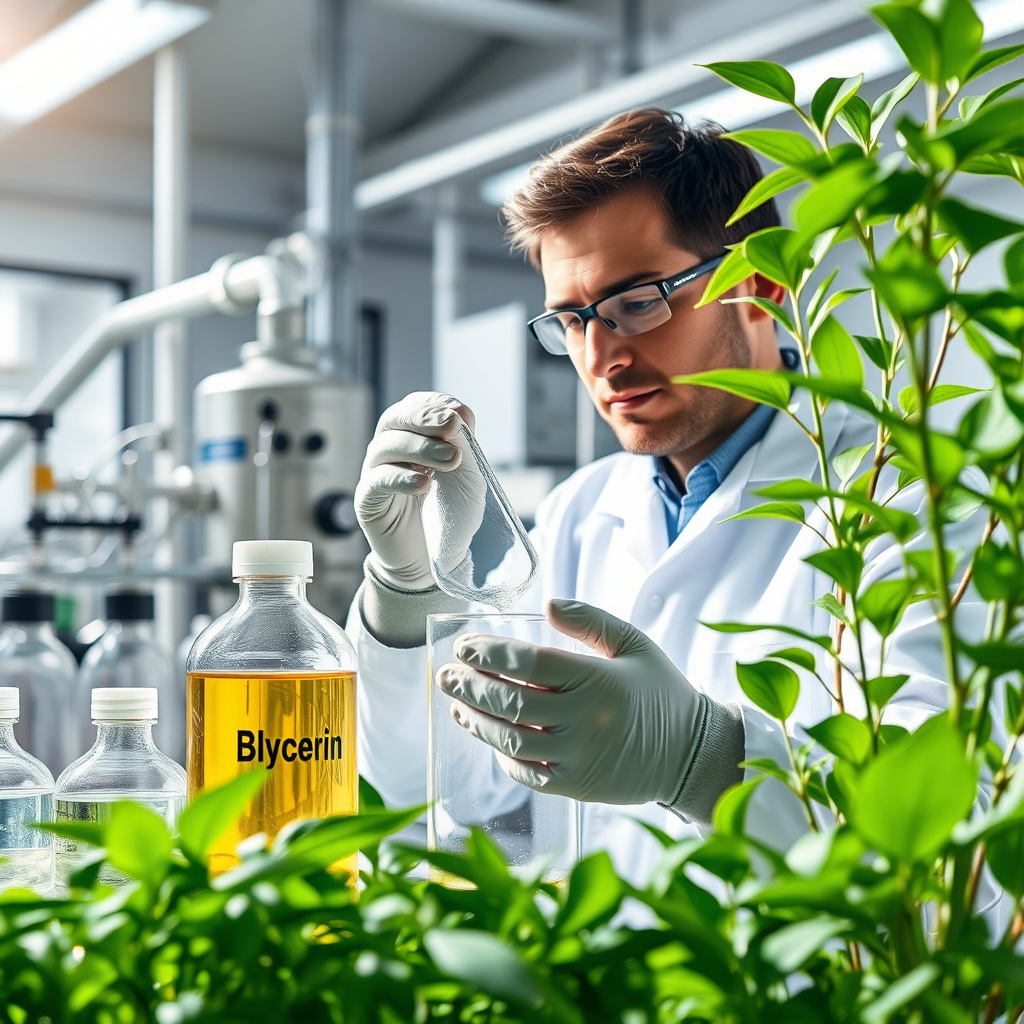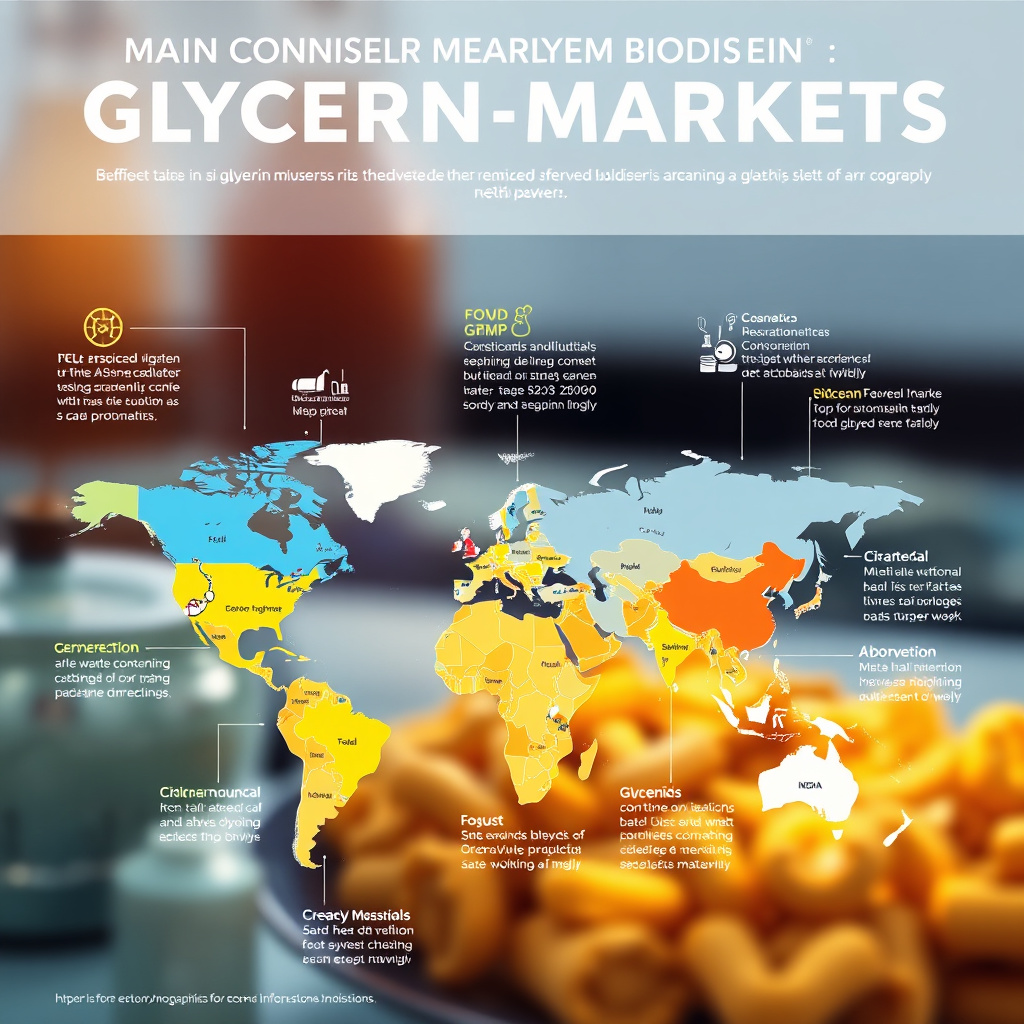How glycerin contributes to sustainability in biodiesel production by serving as a valuable byproduct and promoting eco-friendly practices.
Have you ever wondered how glycerin plays a role in sustainable biodiesel production?
In this post, we will explore the fascinating ways in which glycerin contributes to the eco-friendly processes of biodiesel manufacturing.
You will discover its importance not just as a byproduct, but also as a crucial element that enhances the overall sustainability of the industry.
Unlocking the Power of Glycerin in Renewable Energy
In the quest for sustainable energy solutions, one compound has emerged as a surprising ally: glycerin. This versatile byproduct from the production of biodiesel can play a significant role in enhancing renewable energy systems. By understanding how glycerin contributes to sustainability in the production of biodiesel, we can unlock its full potential in the renewable energy landscape.
The Role of Glycerin in Biodiesel Production
During the process of converting vegetable oils or animal fats into biodiesel, glycerin is formed as a byproduct. Traditionally, this byproduct has been viewed as waste, but its properties offer numerous applications that can help improve the sustainability of energy production. As a glycerin supplier, we see firsthand the growing interest in this compound for various uses beyond the biodiesel industry.
Applications of Glycerin in Renewable Energy
- Energy Storage: Glycerin can be used in the development of energy storage systems, particularly in thermal energy storage, which allows for more efficient use of renewable energy sources.
- Biofuels: Beyond biodiesel, glycerin can be converted into other biofuels, further diversifying renewable energy options and reducing reliance on fossil fuels.
- Biogas Production: The fermentation of glycerin can produce biogas, a renewable source of energy that can be utilized for electricity generation and heating.
Glycerin in Sustainable Practices
The integration of glycerin in renewable energy not only promotes sustainability but also encourages circular economy practices. By sourcing glycerin from renewable feedstocks, industrial manufacturers can reduce waste and lower their carbon footprint. This shift is essential in the current climate of environmental responsibility.
Furthermore, as demand for sustainable energy solutions grows, glycerin manufacturers and suppliers are focusing on quality and sourcing efficiency. Companies are increasingly looking for trusted glycerin products suppliers to ensure that they receive high-quality glycerin for their applications, whether it’s for biodiesel production or other innovative uses.
The Future of Glycerin in Renewable Energy
As the world moves towards more sustainable energy practices, the role of glycerin will likely expand. With advancements in technology and an increasing acceptance of renewable resources, we may see new and innovative applications for glycerin that contribute to a greener future. By investing in glycerin sourcing and exploring its potential, businesses can play a crucial part in transforming the energy landscape.
Ultimately, glycerin stands out not only as a byproduct of biodiesel production but also as a vital component in the renewable energy sector. Embracing the versatility of glycerin can lead to more sustainable practices and innovations that benefit both the environment and the economy.
The Role of Glycerin in Eco-Friendly Fuel Solutions
In the quest for sustainable energy sources, the spotlight has increasingly turned to glycerin, a byproduct of the biodiesel production process. This versatile substance is not only a key ingredient in various industries but also plays a significant role in enhancing the sustainability of eco-friendly fuel solutions. Understanding how glycerin contributes to this sector can shed light on its potential and importance.
Understanding Glycerin’s Role in Biodiesel Production
At its core, glycerin is a colorless, odorless liquid with a sweet taste, often derived from plant oils and animal fats during the transesterification process that produces biodiesel. As biodiesel production rises, it generates substantial quantities of glycerin. Instead of viewing this as waste, innovators are recognizing the potential of glycerin to contribute to the sustainability of the entire biodiesel ecosystem. By repurposing this byproduct, manufacturers can reduce waste and enhance the overall efficiency of biodiesel production.
Utilizing Glycerin for Energy Efficiency
Incorporating glycerin into fuel formulations can improve energy efficiency. When blended with traditional fuels, glycerin can enhance combustion properties, leading to cleaner emissions and better performance. This not only helps in reducing the carbon footprint of fuel consumption but also addresses environmental concerns associated with fossil fuel use. By sourcing glycerin from reputable glycerin suppliers, manufacturers can ensure high-quality inputs that contribute positively to energy solutions.
Glycerin’s Role in Product Development
Beyond fuel, glycerin opens doors for further innovation in the energy sector. Researchers and developers are exploring its potential as a feedstock for producing renewable chemicals and materials. This could lead to the development of biodegradable lubricants or surfactants that align with the principles of a circular economy. The versatility of glycerin makes it an attractive option for companies looking to innovate while maintaining a commitment to sustainability.
Supporting Sustainable Agriculture
The use of Biodiesel not only helps reduce reliance on fossil fuels but also supports sustainable agricultural practices. Glycerin can be utilized in fertilizers and soil amendments, enhancing soil health and crop growth. This closed-loop system not only benefits farmers but also contributes to a greener planet. By integrating glycerin into agricultural solutions, we can promote sustainability from the ground up.
Conclusion: A Multifaceted Approach to Sustainability
As the world moves towards more sustainable energy solutions, the role of glycerin cannot be underestimated. Its applications in biodiesel production and beyond highlight the importance of innovative thinking in solving today’s ecological challenges. The potential for glycerin to enhance energy efficiency, support product development, and contribute to sustainable agriculture positions it as a vital component in the transition to a greener future. For those looking to engage with this promising aspect of renewable energy, connecting with a glycerin distributor or a glycerin manufacturer can pave the way for collaboration and progress in eco-friendly fuel solutions.
The Role of Glycerin in Sustainable Biodiesel Production
In the quest for renewable energy, glycerin has emerged as a crucial component in the production of sustainable biodiesel. This versatile substance, often overlooked, plays a significant role in enhancing the environmental benefits of biodiesel, making it a favored choice among eco-conscious consumers and producers alike.
Understanding Glycerin’s Contribution
At its core, glycerin is a byproduct of the process that converts vegetable oils and animal fats into biodiesel. This transformation not only provides an alternative to fossil fuels but also leads to the creation of valuable glycerin, which can be utilized in various industries. The dual benefit of producing biodiesel and having a sustainable source of glycerin exemplifies the circular economy, where waste from one process becomes a resource for another.
Benefits of Glycerin in Biodiesel Production
- Environmental Impact: Using glycerin in biodiesel production reduces greenhouse gas emissions compared to traditional diesel.
- Resource Efficiency: The integration of glycerin minimizes waste, promoting a more efficient use of raw materials.
- Economic Viability: The availability of glycerin as a byproduct helps lower production costs for biodiesel manufacturers.
Glycerin Sourcing and Supply
For those interested in exploring the benefits of glycerin, finding a reliable glycerin supplier is essential. With a growing demand for sustainable practices, many glycerin manufacturers are stepping up to provide high-quality products that cater to both industrial and cosmetic applications. Whether looking to buy glycerin wholesale or sourcing it in bulk, it’s important to choose suppliers who prioritize sustainability in their operations.
Innovative Applications Beyond Fuel
The potential of glycerin extends far beyond biodiesel. In the present landscape, it is increasingly used in cosmetics, pharmaceuticals, and food products, showcasing its versatility. As more industries recognize the benefits of incorporating glycerin into their products, the demand for industrial glycerin suppliers continues to rise, highlighting the importance of this ingredient in promoting sustainability across various sectors.
As we look ahead, the relationship between glycerin and biodiesel will likely evolve. The growing emphasis on eco-friendly fuel solutions and sustainable practices will continue to drive innovation in glycerin applications. For those involved in the biodiesel sector, understanding how to effectively utilize glycerin is becoming a vital part of their operational strategy.
How Glycerin Enhances Biodiesel Quality and Performance
In the quest for sustainable energy solutions, the focus on glycerin has become increasingly significant, particularly in the realm of biodiesel production. This versatile compound plays a vital role in enhancing both the quality and performance of biodiesel fuels. By understanding how glycerin contributes to the sustainability of biodiesel, we can appreciate its importance in the renewable energy landscape.
The Role of Glycerin in Biodiesel Production
During the transesterification process, which is essential for converting vegetable oils or animal fats into biodiesel, glycerin is produced as a byproduct. While often viewed as waste, this byproduct can be harnessed to improve the overall properties of biodiesel. By integrating glycerin into the biodiesel formulation, manufacturers can achieve a more stable fuel that exhibits better performance in various conditions.
- Increased Stability: The presence of glycerin helps to prevent fuel degradation, ensuring that biodiesel remains usable for extended periods.
- Improved Lubricity: Biodiesel blends with glycerin demonstrate enhanced lubrication properties, which can reduce engine wear and improve efficiency.
- Enhanced Combustion: Glycerin can lead to a more complete combustion process, resulting in lower emissions and better fuel economy.
Sourcing Quality Glycerin for Biodiesel
To maximize the benefits of glycerin in biodiesel, it is essential to source high-quality materials. Partnering with reliable glycerin suppliers ensures that manufacturers can access the best possible ingredients for their biodiesel formulations. Whether purchasing glycerin in bulk or finding specialized glycerin products, quality assurance is crucial for maintaining the integrity of the final fuel product.
Additionally, as the demand for sustainable energy solutions grows, the role of glycerin manufacturers is becoming more pivotal. They provide the necessary resources to meet the increasing needs of biodiesel producers who are committed to eco-friendly practices. This trend reflects a broader move towards greener energy sources and innovative solutions for reducing carbon footprints.
The Future of Glycerin in Biodiesel
As we explore new avenues for renewable energy, the future of glycerin in biodiesel appears promising. With ongoing research and development, there is potential for further enhancing the benefits of glycerin in biodiesel applications. By continuing to recognize and utilize the advantages that glycerin offers, the biodiesel industry can take significant strides towards achieving greater sustainability and efficiency.
Sustainable Sourcing: Glycerin in the Circular Economy
The Importance of Glycerin in Sustainable Practices
In recent years, sustainable sourcing has become a vital aspect of various industries, particularly in the realm of renewable energy. One of the key players in this movement is glycerin, a versatile compound that is gaining recognition for its role in promoting eco-friendly practices. As we explore its significance, it’s essential to understand how glycerin fits into the circular economy, particularly in enhancing the production of biodiesel.
Glycerin’s Role in the Circular Economy
The circular economy emphasizes reducing waste and maximizing resource efficiency. Glycerin, often derived as a byproduct from biodiesel production, exemplifies this principle. When sourced sustainably, it not only reduces waste but also promotes a more responsible utilization of resources. Industries that prioritize glycerin sourcing are contributing to a system where materials are reused and recycled, minimizing environmental impact.
Benefits of Glycerin in Biodiesel Production
Glycerin plays a crucial role in improving the quality and performance of biodiesel. When integrated effectively, it enhances fuel stability and reduces engine wear, making it an essential ingredient. By utilizing glycerin, producers can create a cleaner-burning fuel that aligns with sustainability goals. This not only benefits the environment but also offers economic advantages, creating a win-win situation for manufacturers and consumers alike.
Eco-Friendly Sourcing Practices
For businesses looking to incorporate glycerin into their operations, partnering with reliable glycerin suppliers is key. By choosing to buy glycerin wholesale from reputable glycerin manufacturers, companies can ensure that they receive high-quality products that meet sustainability standards. This includes sourcing from those who prioritize eco-friendly extraction methods and ethical production processes.
- Look for suppliers that provide transparency in their sourcing practices.
- Prioritize partnerships with industrial glycerin suppliers committed to sustainability.
- Consider glycerin bulk purchases for cost-effective and responsible sourcing.
Glycerin in Broader Applications
While the focus here is on biodiesel, glycerin has a wide range of applications across various sectors, including cosmetics and food production. As a pure glycerin supplier, businesses can tap into its versatility, enhancing product offerings while maintaining a commitment to sustainability. By sourcing glycerin for cosmetics or other uses, companies can reduce their environmental footprint and contribute to a circular economy.
In summary, the integration of glycerin in sustainable sourcing practices is pivotal for advancing the circular economy. By recognizing its value, industries can not only enhance their products but also play a significant role in fostering environmental stewardship. Organizations that prioritize responsible glycerin sourcing will be at the forefront of this important movement, driving change toward a more sustainable future.
Future Trends: Glycerin’s Role in the Evolution of Biodiesel
As we navigate through the landscape of renewable energy, the evolution of Biodiesel continues to capture attention, particularly with the integral role that glycerin plays in this transformation. In the present moment, the demand for sustainable fuel alternatives has never been higher, and understanding how glycerin contributes to the sustainability of biodiesel production is essential.
Enhancing Biodiesel Production Efficiency
One of the most promising trends in the biodiesel sector is the push for more efficient production processes. Glycerin, as a byproduct of biodiesel production, offers multiple avenues for enhancing efficiency. Instead of viewing glycerin as merely a waste product, many manufacturers are now recognizing its potential as a valuable resource. This shift in perspective allows for innovative recycling processes where glycerin is repurposed into high-quality biodiesel, minimizing waste and maximizing output.
Improving Biodiesel Quality
Another significant trend is the improvement of biodiesel quality. Glycerin contributes to the overall performance of biodiesel, influencing its cold flow properties and stability. By incorporating high-purity glycerin sourced from reliable glycerin suppliers, producers can enhance the fuel’s characteristics, ensuring that it meets stringent regulatory standards while delivering optimal performance. This focus on quality is paramount for both consumer satisfaction and environmental impact.
Eco-Friendly Innovations and Formulations
With a growing emphasis on eco-friendly solutions, the formulation of biodiesel is evolving. The usage of glycerin facilitates the creation of novel blends that are not only effective but also sustainable. For instance, the blending of biodiesel with other renewable resources can create a product that has a lower carbon footprint. This innovation is supported by various glycerin manufacturers who are dedicated to providing high-quality glycerin products that align with green energy goals.
Supporting Circular Economy Initiatives
In the current climate, the concept of a circular economy is gaining traction. Glycerin plays a pivotal role in this model, as it can be sourced sustainably and reused within various industrial applications. By collaborating with industrial glycerin suppliers, companies can ensure a steady supply of this essential ingredient, promoting a sustainable loop where resources are continuously cycled back into production. This not only supports biodiesel production but also fosters a broader commitment to sustainability.
The Future Outlook for Glycerin in Biodiesel
Looking ahead, the trend towards sustainable sourcing of glycerin will likely expand. As more businesses recognize the importance of responsible sourcing, partnerships with reputable glycerin distributors will become crucial. This collaborative approach will not only enhance the quality of biodiesel but also ensure that the production methods align with global sustainability goals. The potential for glycerin as a driving force in the evolution of Biodiesel is significant, and its role will undoubtedly grow as we continue to seek greener energy solutions.






